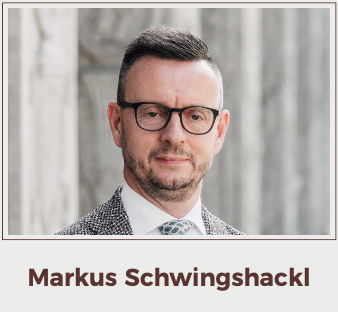|

Markus Schwingshackl Markus is a private wealth lawyer assisting global wealth owners, entrepreneurs, and their families in navigating the complexities of wealth management, wealth planning, estate planning, and family offices. He is qualified to practice in Switzerland, Liechtenstein, and Austria and is the founder of Centro LAW, a wealth management and family office lawfirm based in Zurich, Switzerland. Markus also specializes in financial product and digital assets regulation, with significant experience in blockchain and fintech. Further fields of activity include white-collar crime, cybercrime, and cross-border financial crime. 
Matthias Knab, Publisher Editor’s Note from Matthias Knab: Think you can’t get conned? Think again, and learn from Maria Konnikova how to spot the con before they spot you. After I received global recognition and praise (thanks to Vanity Fair, Spear’s Magazine, DN.no - english version here - Opalesque, and LinkedIn) for helping to expose family office con man “Sir” Anthony Ritossa (actually already in 2018), a friend recommended me to take a good look at “The Confidence Game: Why We Fall for It . . . Every Time". It's a compelling investigation into the minds, motives, and methods of con artists—and the people who fall for their cons over and over again. I highly recommend it! 
We live in a world where digital value exchange seems to have no boundaries. How we create, transfer, and protect wealth has changed profoundly, and in many instances, we benefit from these technological advances. However, there is a dark side. Cybercrime has increased incrementally over the past few years, and fraud has become a severe issue due to the overlap of digital communication and finance. In addition, cryptocurrencies have opened new opportunities for scammers to defraud wealth owners on a large scale. From romance scams to highly sophisticated investment frauds, the power of awareness and caution is often underestimated. Still, it is an essential first line of defense in this ongoing battle against online fraudsters. The increasing prevalence of cybercrime According to the Swiss Police Crime StatisticsReport in 2022, 37.7% of all reported criminal cases involved a digital crime modus operandi. Those cases increased by 10% compared to the previous year, and most of them were fraud. With the advancing digitalization in the economy and society and the associated benefits for our daily lives, scammersare also keeping up with technological progress. Digitalization is not the cause of crime but rather a means to an end. Traditional fraud patterns remain the same and are transferred by criminals to the digital world. Cybercrime is, therefore, just the digital variant of familiar forms of fraud but follows different rules than traditional crimes. The appeal of wealthy targets It will come as little surprise that a wealthy victimis attractive to fraudsters because it promises a higher return. Cybercriminals are organized in a less structured way than one might think. So-called crime- as-a-service offerings allow anonymous perpetrators to operate professionally with low entry barriers. For law enforcement, such international associations are difficult to prosecute, as cross-border investigations are time-consuming and complicated. Furthermore, scammers can use information from social media or news reports to prepare their plans better and impersonate trusted sources. Con artists play on some of the most fundamental instincts of their victims. Depending on the situation, they appeal to greed, vanity, fear, helpfulness, and trust to gain an advantage through deception. This is often easier to do in the digital space. Social media provides access to wealthy victims that would be much more difficult to obtain in the real world. 
Let’s consider a romance scam. This is marriage fraud in the digital space. While a real-world initiation can be challenging, social media provides an ideal platform to create an emotional bond that can leada victim to take imprudent financial actions. For the perpetrator, the costs and risks are reduced. And the approach can be scaled. Let us examine a scenario involving an affluent older woman. She sharesher privileged lifestyle on social media but hintsat loneliness. Scammers don’t even have to make contact in real life but can cleverly approach her via the platform and test her suitability as a victim. If she passes the test, the perpetrators will proceed with their usual business, following a tested and proven script. The particulars of defrauding wealthy individuals Compared to the average online scam, those targeting wealthy individuals are more sophisticated and tailored. A clever and personalized approach is required to deceive high-net-worth individuals into sharing personal information and making specific financial decisions. Furthermore, in many cases, the strategy must be long-term to build trust and avoid skepticism. If the infiltration occurs via networks, this takes another effort to fake credibility and trustworthiness. For scammers, the potential reward is significantly higher than in other fields. Wealthy individuals are often older and less familiar with technology than younger generations. They may also lack awareness of potential threats, e.g., by sharing too much information about their personal life and wealth on social media, making them an attractive target. Furthermore, emotions and irrational thinking may drive wealthy victims’ financial decisions. The idea of an ideal outcome may sway them, causing them to fail to recognize the associated risks, become overconfident, and succumb to enticing promises. Scammers are highly skilled at identifying and exploiting these vulnerabilities to achieve their malicious goals. The following real-life case studies will elaborate on specific cybercrimes targeting the wealthy. Case Study 1: The pig butchering scam Let’s take the example of Aron, a 48-year-old entrepreneur from Switzerland. He is married with two children, and to relax from his hard work, he likes to spend time on social media, where he meets Alexa, a supposedly 35-year-old Italian who seems to share Aron’s values and social standing. The conversation begins innocently enough when Alexa comments on one of Aron’s posts, emphasizingthat success only comes from hard work. Most of their interactions are about entrepreneurship and dedication to achieving goals. There’s no sign of romantic vibrations between our protagonists, but Aron soon begins to trust Alexa. He is impressed by her success in business and her independence. Alexa regularly shares pictures of her business trips and her apartments in Rome and London and seems to manage life effortlessly. After several weeks, Aron asks Alexa how she can be so successful in business and still enjoy her life in many ways. Alexa is reluctant to share her story, which makes Aron even more curious. 
Finally, Alexa tells him that her uncle is a trader and runs a platform for professional traders. Her wealth is derived from trading activities, as her uncle is a genius at analyzing charts and predicting market trends. His track record is second to none, especially regarding cryptocurrencies. Aron holds some cryptocurrencies, but so far, his investment performance has been nothing more than reasonable. Over time, with regular chats and video calls between the two, Aron will bring up the topic of crypto trading again. Alexa explains that access to the platform is restricted and that only selected investors can participate in an algorithmic trading plan. The minimum amount is CHF 2 million in cryptocurrencies, and investments must be held on the platform for seven days. Under Alexa’s guidance, Aron opens multiple wallets with different providers, exchanges cash for cryptocurrencies, and transfers them to specific wallets. Although the platform is quite complicated, Aron makes a profit by trading. He follows Alexa’s instructions, and soon, his balance equals CHF 3 million. Alexa keeps coming up with new trading ideas and opportunities. On the third day, she tells Aron that her uncle has now opened a CHF 5 million trading plan. Since Aron’s balance is already worth CHF 3 million, he would only need to contribute another CHF 1 million. She would cover the rest with a line of credit since she finished the last program with substantial profits. With that, he would be able to realize CHF 8.5 million. Aron is excited and contributes, as discussed. All goes well, and Aron first pays back the loan to Alexa’s wallet from one of his other wallets. Since the seven- day investment period is over, Aron is in the process of withdrawing his funds. However, his contact with Alexa is abruptly cut off, his access to the trading platform is denied, and Aron realizes he has become a victim of pig butchering. According to the FBI Internet Crime Report 2021, in this relatively new approach, the scammer gains the confidence and trust of the victim via social media platforms and then claims to know about cryptocurrency investment or trading opportunities that will result in substantial profits. Victims register with fake investment platforms. They transfer large amounts of cryptocurrency to wallets controlled by fraudsters. In the end, the entire investment will be lost. 
Photo Credit: Infosec Images Case Study 2: The boiler room scam Daniel is a retired C-level executive from Germany who enjoys gardening and traveling to places of culture and history. His considerable wealth is managed by his private banker. Daniel is intrigued by new technologies, but his private bank does not offer investments in digital assets. This is how Daniel starts to read about blockchain technology and its use cases. He soon opens an account with a crypto exchange and buys his first cryptocurrencies. However,Daniel was disappointed with the whole experience as he was expecting more activity and wanted to contribute to the performance of his investments. As a result, he continues to search the internet for other options and comes across the professional-looking website of a cryptocurrency investment platform. Daniel is impressed by the information providedand the various charts and analyses that satisfy his appetite for more sophisticated investments. Being cautious and suspicious, he checks the company’s registrations in corporate registers, and it even seems that various international regulators supervise the platform. Daniel proceeds to register. He loves the intuitive navigation and seamless process. During onboarding, he provides information about his wealth as part of the assessment and is immediately directed to the platform’s VIP service. This includes the support of a personal advisor and is available only to high-net-worth individuals. Daniel gladly accepts the offer and is guided through all the steps by his advisor. The contactis made via a messenger service, accounts are opened on exchanges, and transactions to purchase cryptocurrencies are carried out. If Daniel needs help with the technical implementation, his advisor supports him with remote maintenance software that gives him direct access to his computer. The first investment is a small transaction that is immediately successful. The advisor continues engaging Daniel in personal conversations, admiring his success and willingness to take risks in investing. After all, he says, this is why the VIP Desk is taking care of him, and together, they will achieve great results. The contact is almost daily, and Daniel investsmore significant sums that generate larger returns. Whenever he talks about withdrawals, his advisor explains that he needs to stay invested to achieve his goals. When Daniel’s private banker inquires about the reasons for the high outflows, Daniel tells him that he is now investing in crypto and is doing very well. The private banker warns him of the dangers, and Daniel tells his advisor, who suggests that he liquidate some of his investments to see if he canget his assets back at any time. This is done withthe assistance of the personal advisor, and after everything goes smoothly, Daniel invests several million, much more than he originally intended. Whenever he has further doubts, his advisor increases the pressure, sometimes with insults that he is too scared and cowardly, but then again, to praise his courage. Daniel finds this strange. But as long as his investments are doing well, he listens to his advisor. Weeks go by, and Daniel finally wantsto take profits and liquidate his holdings. Whenhe informs his advisor, he receives some tax bills that must be paid in advance. Furthermore, certain transactions also have additional fees for liquidating investments. Daniel becomes suspicious, and his advisor’s tone changes dramatically. After the service provided and the high profits, how could he doubt the seriousness? All he has to do is pay the last outstanding costs, and he will have access to all his crypto assets. But Daniel insists on a refund, only to discover from one day to the next that he no longer has access to his account, nor can he reach his advisor. He realizes that he is the victim of a crypto scam. Such a cryptocurrency fraud is a variation of a familiar approach called a boiler room scam. According to the US FINRA’s National Cause and Financial Crimes program, boiler room operations are used to pitch dubious investment schemes. Scammers run outbound call centers, and their boiler rooms are characterized by high-pressure sales pitches from promoters targeting investors with highly speculative, often fraudulent, investments. This goes beyond phone calls since modern boiler rooms rely on digital means to contact and manipulate potential investors, such as messaging apps and social media. They even manage to get access to their victims’ computers and data. Our examples demonstrate the sophistication of digital fraud. Detailed scripts to achieve scalability and convincing role-play with the ability to handle unexpected situations are some of the required capabilities. These are just two of the types of frauds to look out for. And scammers target not only wealthy individuals but also their wealth management entities. The vulnerability of family offices While corporates are doing their homework and increasing cybercrime protection, according to the UBS Global Family Office Report 2023, cyber and information security is an example of where family offices could strengthen their risk management. While 44% of family offices have cyber security controls in place, 37% have been the target of attacks, some more than once. Only 15% of those having controls in place see those controls as highly advanced. Next to typical corporate cybercrime tactics, one example being spear-pishing to steal sensitive information such as account details and financial information, scammers may pose as legitimate businesses, investment brokers, or consultants offering exclusive investment opportunities. These scams involve elaborate presentations, fake companies and websites, and fraudulent documents that seem credible. Such highly sophisticated, complex structures and cunningly designed processes which lead in the end to straightforward investment fraud, have cost the wealthy staggering sums. Case Study 3: Sophisticated investment fraud For example, a scammer may pose as a billionaire and seek introductions, often referring to joint business partners and advisors. Such con artists create elaborate networks of potential victims by using name-dropping and the credibility of others. They keep these networks busy interacting, hoping that sooner or later, someone will begin to trust them. Any information they obtain can be helpful in further attempts to defraud family offices and their families. Consider a scenario where the CEO of a newly established single-family office is approached by a principal of another family office. The principal claims to be the family business leader of an old European family with global investment activities. He also offers the opportunity to co-invest in specific industries in emerging countries where his family has longstanding business experience and success. His social media profiles display his impressive education and connections to prominent global business leaders. However, the internet reveals only tiny hints about the highly successful businesses of the family. According to the principal, this intentionally ensures the family’s privacy. 
Photo Credit: Clare Street Soon, the family office’s CEO is introduced to various international business partners and advisors. Substantial communication occurs, and the CEO finds it challenging to keep up with virtual meetings. However, he doesn’t want to miss out on the opportunity to enable the family office to access such an exclusive network. Confidential information about the parties’ activities and background is revealed during video calls moderated by the principal. Various investment opportunities are discussed casually, and term sheets are provided to the CEO. All options are only open for a short period and would require immediate action and down payments. The CEO asks the family office’s lawyer to review some investment opportunities, but the lawyeris suspicious due to the unorthodox approach. However, the scammer has done his homework, and only after a deep examination and due diligence do questions about the family’s history and activities appear. Although the provided information seems coherent initially, certain investment vehicles are linked to individuals with questionable backgrounds. Once confronted with this information, the principal is extremely upset and announces that the family office is no longer part of the exclusive network. As it will turn out later, some other parties have already made down payments and lost their investments. While this is not the case for our family office, confidential information that may pose a potential risk for further criminal attacks has leaked. This example shows that family offices must consider cybercrime and investment fraud a risk category regardless of financial losses and implement specific risk management frameworks and processes. What are the chances for successful asset recovery? After falling victim to cybercrime, wealth owners wonder how to recover their stolen assets. Cryptocurrency transactions are traceable on the blockchain as a digital, immutable ledger, and at first glance, this sounds promising for recovering funds. However, organized crime also uses sophisticated schemes to make traceability difficult. Often a series of wallets and specific concealment transactions are used, and exchanges with fake identity accounts are interposed. Even if scammed cryptocurrencies can be traced and located, this is only a first step, and subsequent court procedures to freeze assets must be instigated. Fraudsters intentionally direct their proceeds to jurisdictions where such procedures are cumbersome and costly. Frequently, they use anonymization techniques, such as virtual private networks, identity theft, and money mules, to conceal money flows further. All too often, the entire process places a further emotional burden on victims, and some prefer to close the case rather than pursue legal remedies. Law enforcement is also facing substantial challenges due to the cross-border nature of cybercrime, and international assistance in criminal matters is a slow and complicated process. Scammers act in an almost anonymous environment with limited legal means to counter them. To conclude The ongoing evolution of cybercrime presents a substantial threat to affluent individuals as organized crime exploits the advancements in digitalizationand technological progress in effectively adapting traditional fraud tactics to this new digital landscape. These cyber assaults often meticulously target specific demographic groups, and affluent individuals have emerged as appealing victims for scammers. Publicly accessible information, particularly from social media platforms, has unintentionally become a valuable resource for them, simplifying their illicit activities. In addition, criminals are increasingly targeting family offices. This may be due to their inadequate risk management frameworks. Once the damage has been inflicted, the prospects of successfully tracing and recovering stolen assets are frequently modest. Coupled with the financial loss is an emotional burden borne by the victims. In many instances, this psychological trauma proves more daunting than monetary losses. While law enforcement agencies and the legal sector combat these criminal phenomena, proactive vigilance remains the most potent weapon in the fight against cybercrime. The first line of defense against online fraudsters is awareness and caution, which are often underestimated but essential. | ||||
|
Horizons: Family Office & Investor Magazine
Wealth and Worry: Unprecedented Numbers of Cyber and Investment Frauds Hit the Affluent |
|





 RSS
RSS









